Pancake Tuesday and Ash Wednesday - the start of Lent
Written by Anne Newman, Monday, 4 March 2019 with additions 2023
The day before Lent begins is called Pancake Tuesday or Shrove Tuesday. Shrove Tuesday is so called because it is the day your sins are forgiven or shriven, but it is more commonly called Pancake Tuesday.
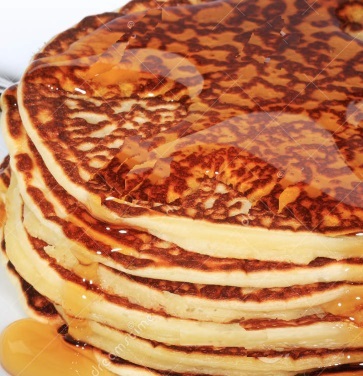
The connection between pancakes and Shrove Tuesday dates back to when fasting in Lent was strictly observed. Meat was banned and most Irish families ate only one small meal per day, probably potatoes, without the usual butter and milk! Making pancakes provided the opportunity to use up the household's butter, eggs and flour.
The actual tradition of mixing them up for pancakes is thought to come from a pagan ritual, but others say it is a Christian tradition - with each ingredient representing one of the four pillars of the faith. Eggs for creation, flour sustenance or the staff of life, salt for wholesomeness and milk for purity.
Pancakes have been around for centuries as a favourite staple in many cultures’ diets. They began over 30,000 years ago during the Stone Age. Researchers have found pancakes in the stomach of Otzi the Iceman, human remains dating back 5,300 years.
Pancakes exist all over the world and it seems that each culture has its own unique take on them. They are served for breakfast, lunch, and dinner all over the world : French crepes, potato latkes, Irish boxty, Scotch pancakes, Russian blini, Welsh crampog, Indian poori, Hungarian palacsinta, and Dutch pannenkoeken are a few of the variations. They can be sweet or savoury. Even in the UK there are some variations. For example Welsh cakes, or light cakes are eaten in Wales while many pancakes in Gloucester are made with suet, a hard, white or pink fat made from beef or mutton.
I grew up with sweet pancakes. Mum would make the batter and leave it stand for an hour in the fridge Then a good ladle of the batter was put into the pan and flipped once, and then covered in sugar and lemon juice and rolled up. My Mum used to save them in the oven. When I got married and I made them for my family, it was hard to keep up with the demand! The pancakes disappeared almost as quickly as they were made.
Pranks and Tricks
It is a custom to make pancakes and to have them for the tea in the evening, and on that evening people give pancake to other people. They call them into the kitchen to give them a pancake and when they get them in they would have a saucer of polish and soot waiting and when the person would be eating the pancake, they would blacken their faces all, and that is called 'pancake sieve'. On Ash Wednesday when people were not allowed to eat anything - they had to eat gruel with nettles in it. An account from Louth School's project
Also from Louth:
A joke about the "Pancake Sieve" takes place in this part of the country. A boy or girl that is innocent of the joke, is sent to the neighbour for the loan of a "Pancake Sieve". The neighbour knows the joke and he rubs his hands to the pot and then rubs them to the messengers face. Pancake Sieve Trickster
And Ash Wednesday was another occasion to fool friends and neighbours:
Ash fun from Co. Monaghan - Duchas.ie
Ash Wednesday is enjoyed by children and young folk. They pin ash-bags on other people's backs. Long ago these were wee bags of ashes, tied in the top and pinned on some person's back. Now it is pieces of paper which is pinned on.
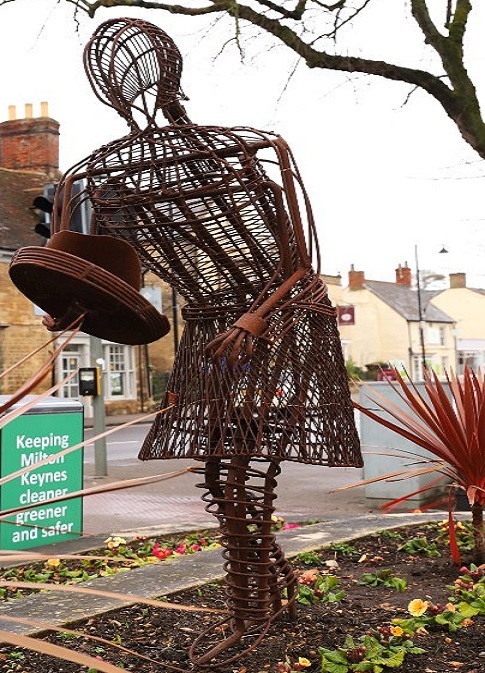
Pancake Races
There is also a tradition in some places to have pancake races. People race to the finish, flipping pancakes on a frying pan as they go. The winner is the first to the finish line with a pancake.
The Olney Pancake Race is held at Olney in Buckinghamshire on Shrove Tuesday. It is one of the best known pancake races in the United Kingdom.
The course for the Olney Pancake Race is about 415 yards long (about 379 meters). Competitors must wear traditional costumes that include a skirt, apron and head covering to run the race. Each contestant has a fryingpan containing a hot pancake. They must toss it three times during the race. The first person to complete the course and arrive at the church is the winner.
At Westminster School in London, the annual Pancake Grease is held. A verger from Westminster Abbey leads a procession of boys into the playground where the school cook tosses a huge pancake over a five-metre high bar. The boys then race to grab a portion of the pancake and the one who ends up with the largest piece receives a cash bonus from the Dean.
Skipping
In Scarborough, Yorkshire, on Shrove Tuesday, everyone assembles on the promenade to skip. Long ropes are stretched across the road and there maybe be ten or more people skipping on one rope. The origins of this custom is not known but skipping was once a magical game, associated with the sowing and spouting of seeds which may have been played on barrows (burial mounds) during the Middle Ages.
Football
Many towns throughout England used to hold traditional Shrove Tuesday football (‘Mob Football’) games dating back as far back as the 12th century.
The practice mostly died out with the passing of the 1835 Highways Act which banned the playing of football on public highways, but a number of towns have managed to maintain the tradition to the present day including Alnwick in Northumberland, Ashbourne in Derbyshire (called the Royal Shrovetide Football Match), Atherstone in Warwickshire, Sedgefield (called the Ball Game) in County Durham, and St Columb Major (called Hurling the Silver Ball) in Cornwall.
Ashbourne 2003 and Prince Charles throws the ball to start the Game between the Up'ards and the Down'ards.
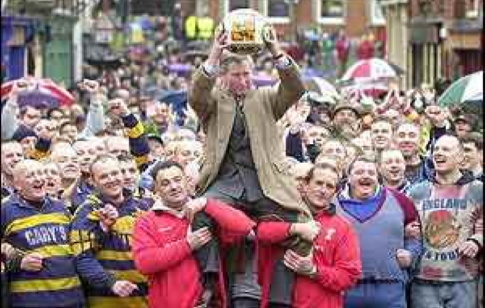 | 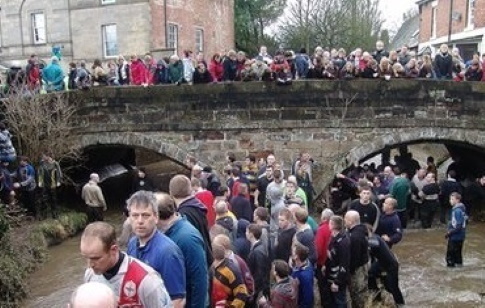 |
Carnival
Mardi Gras is French for "Fat Tuesday", reflecting the practice of the last night of eating richer, fatty foods before the ritual fasting of the Lenten season. Many countries round the world have Mardi Gras celebrations and carnivals. Some of the most famous are in Rio de Janeiro in Brazil, New Orleans in the U.S.A., Venice in Italy and Sydney in Australia.
Camille wrote a blog about Mardi Gras in New Orleans, her home town, which you can read here - Mardi Gras in Louisiana
Laissez les bon temps rouler! Happy Mardi Gras!

The Rio carnivals started over 250 years ago when the Portuguese settlers brought a form of carnival called 'entrudo' with them. It consisted of people throwing flour and water over each other! In 1856 the police banned entrudo carnivals because they were becoming violent and lots of people were getting hurt. This is when the carnival, like it is today, started, with large processions of people marching, singing and dancing.
People taking part in the parade dress up in very bright exotic clothes. Sometimes the costumes are made on large wire structures so the people wearing them look very big, like butterflies or birds. There are big floats, with stands for singing and dancing on built into cars or lorries that take part in the parade, they are decorated as brightly as the people.
So, whatever way you celebrate, enjoy your pancake feast.
Ash Wednesday the start of Lent
Ash Wednesday got its name from the practice of the priest making the sign of the cross on the forehead and reminding us:
“Remember, man, that thou art dust,and to dust thou shalt return”.
The ashes were be prepared by burning palm leaves from the previous year's Palm Sunday celebrations. Ash is used because it is a symbol of death, because all bodies turn to ash or dust in the end.
Ash Wednesday is exactly 46 days before Easter Sunday. Easter is a moveable feast based on the cycles of the moon and falls on the first sunday after the first full moon after the equinox. This year Easter falls on 21st April so Ash Wednesday is on March 6th. The earliest date Ash Wednesday can occur is 4 February, The latest date Ash Wednesday can occur is 10 March.
Ash Wednesday is the first day of Lent, the forty days which are designated days of fasting and abstinence preparing for Easter. The number forty had great biblical significance. The Israelites wandered forty years in the wilderness. Moses spent forty days on Mount Sinai. Christ fasted forty days in the desert. Late in the sixth century, Pope Gregory the Great set the pre-Easter fast at 40 days, excluding Sundays which were feast days.
In Lent there used to be total abstinence from meat, eggs, butter, milk and animal fats. For breakfast, a family might have had a small meal of dry bread, or porridge, washed down with black tea - and then the same for supper. For their midday dinner, the meal was usually potatoes seasoned with fish or onions. Families living on the coast might also have had shellfish and edible seaweed for their dinner.
In Lent no merry-making of any kind was allowed or tolerated. That meant no music, dancing, card games or even visiting with the neighbours. There were no marriages during Lent. Many people also gave up smoking as well as alcohol 'for the duration'.
By the middle of the nineteenth century, the rigid austerities of the Lenten fast had been greatly relaxed so that the majority of Irish people observed 'the black fast'- one meal and just water to drink only on Ash Wednesday and Good Friday. There was also a welcome break from the long, sombre days to look forward to - the feast of St. Patrick on March 17th when there was a break from Lenten rules.

Skellig Night
Although marriage was forbidden from Ash Wednesday to Low Sunday in Ireland, at one time, the priest of the parish in which the rocky islets, called the Skelligs are situated, used to go out, and perform the ceremony on the Great Skellig after Shrove Tuesday.
Accordingly, any couple who wished to get married during Lent started for Valentia, off the coast of which the Skelligs are situated. Rev. R. S. Patterson, Chaplain to Her Majesty’s Forces, Cork, 1889
Further explanation is here : The Fading Year - Shrove Tuesday
The Irish Times reports: Skelliking Day – aka Skelliging or Skeleton Day
Every Shrove Tuesday until very recently, in the Co Cork towns of Blarney and Cobh, the girls’ school would close about an hour before the boys’, to give the girls a chance to get home safely. Sometimes you’d even see the local Garda sergeant making himself conspicuous at the school gates, in an attempt to temper the chaos that was about to unfold.
This was Skelliking Day – aka Skelliging or Skeleton Day – when, for as long as anyone can remember, the boys had free licence to chase the girls, corral them with ropes, tie them up and eventually douse them with water.
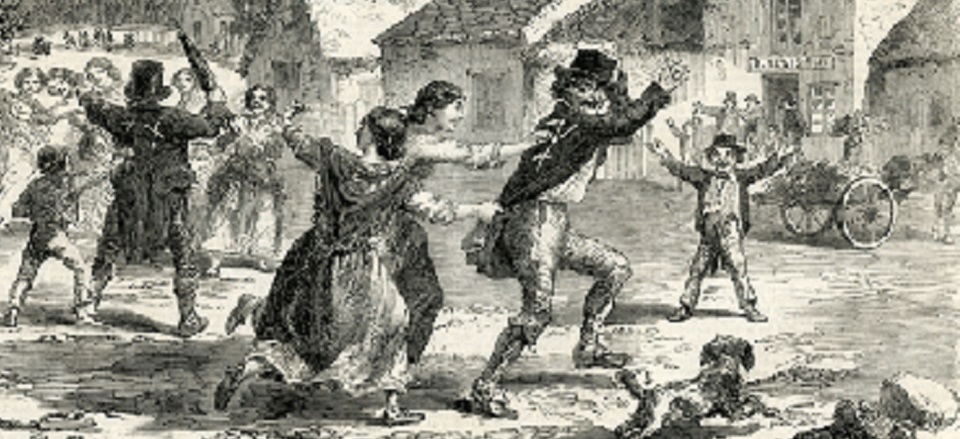
Chalk Sunday
Chalking the married or unmarried?
"Chalk Sunday" according to Michael Scanlon (Clogherclemin) is the 1st Sunday after Ash Wednesday and the people who got married during Shrove are chalked. But Peggy Dorgan says it is the last Sunday of Shrove, and that on that day the men used to have chalks and chalked everybody that was the age to get married but did not.
In Laois - Here it's the bachelors
Chalk Sunday was celebrated on the Sunday before Ash Wednesday. It was called Chalk Sunday because all the Bachelors were chalked. A group of people got together and decided on certain men whom they looked on as bachelors and they arranged to chalk their age on their backs.
and in Tipperary - Were they really for sale?
Chalk Sunday is the first Sunday in Lent. Old bachelors are chalked coming out from Mass on Chalk Sunday. In this district the custom of chalking is kept up. The old bachelors and maids are not pleased when they are chalked. It shows they are up for sale again next year.
The people when chalking each other make figures or drawings on the other's backs. One of the boys buy the chalk some time before Chalk Sunday and distribute it among the rest of the boys. There aren't any proverbs or expressions connected with Chalk Sunday.
Chalk Sunday - taking it a bit too far?
In olden times the old people used to carry out games such as dipping peoples heads into water and roping them on Chalk Sunday. They also were made to kiss the legs of the tables, pots and chairs. They would be sent to different parts of the town and were made go into neighbours houses and kiss the hobs and the husbands wives. The boys and girls, who were not married, used to go around with their backs chalked.
Not surprising that Co. Meath girls get miserable
Chalk Sunday called in this district "Pusach" Sunday. Girls who have got no offers of marriage before Shrove are "pusach" or vexed looking. (heard from the older people of the neighbourhood).
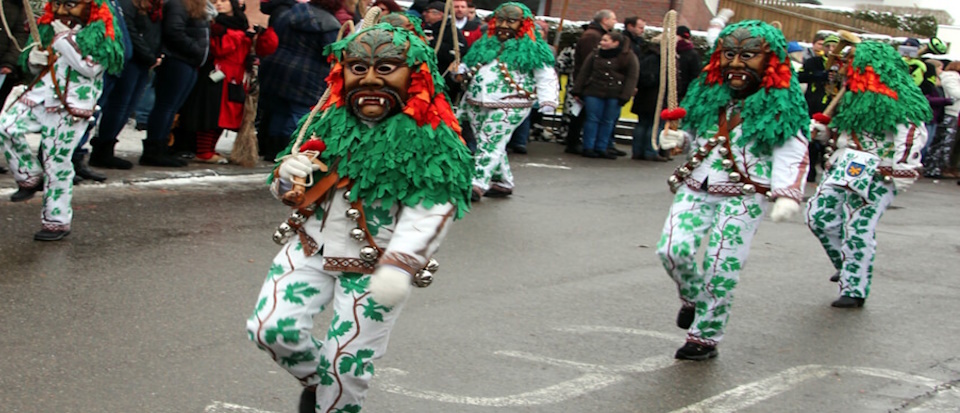
Fasching in Germany
These parades take place the week before Ash Wednesday, ending the night of Shroud Tuesday. It is an entire week of festivities and parties ending with a huge parade with masked creatures, floats, bands and tricks, such as tying shoelaces together or spinning people round. Dating back to pagan times it was a way of driving off the evils of winter and encouraging spring to arrive with plentiful crops.
The word Fasching dates back to the 13th century and is derived from the Germanic word vaschanc or vaschang, in modern German: Fastenschank = the last serving of alcoholic beverages before Lent. Fasching, Karneval and more
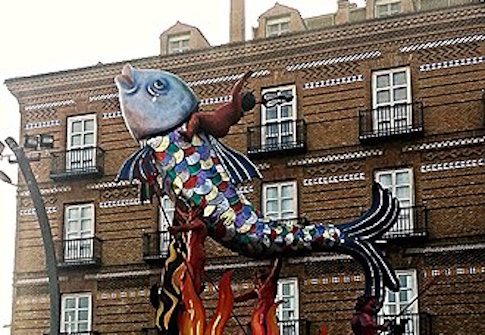
Burial of the Sardine
Spain celebrations start on ‘Jueves Lardero‘ (Fat Thursday) and finish on Ash Wednesday, when the ‘Burial of the Sardine’ takes place. This symbolises the abstinence from eating fish during the 40 days that follow and is a symbolic way of burying the past along with errors, reborn clean, with more strength and experience.
The “Burials” generally consist of a carnival parade that parodies a funeral procession and culminates with the burning of a symbolic figure, usually a representation of a sardine.
Drogheda - Louth. Burying Herring
During Lent, the forty days before Easter, many Irish people did not eat meat. For this reason, butchers sold very little during this time, since the meat was replaced by herring, a cheap and abundant fish.
However, after so long without eating meat, many people were already tired of eating fish, so they were celebrating the end of Lent with a funeral on Easter Sunday: a funeral for herring.
The ceremony was usually organized by butchers. In Drogheda and other towns in Louth County, a fish was attached to a long piece of wood, which was carried in procession through the city. The fish took blows until reaching a bridge, where its remains were thrown into the river amid insults and swearing. Afterwards, the procession followed with a lamb instead of fish, and music to celebrate the end of abstinence.
Many of these processions also aimed to raise funds for those most affected by Lent, such as butchers and livestock farmers. Burying the Herring





